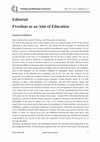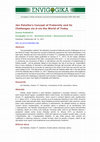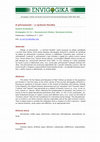Courses by Zuzana Svobodová
This course is a very short introduction to ethics as practical philosophy with three main steps.... more This course is a very short introduction to ethics as practical philosophy with three main steps. In the first step, I speak about gifts of ethics and when this part of philosophy comes to us. In the second step, the most important “isms” of ethics, which were developed to this day, are presented. And in the last step, I share with you a theory of the movement of existence invented by professor Jan Patočka, the best Czech philosopher. 3 video lessons208 views
Videos by Zuzana Svobodová
The paper deals with Comenius’ metaphors as regards the entrance to wisdom, in particular through... more The paper deals with Comenius’ metaphors as regards the entrance to wisdom, in particular through a gate and a door (porta and janua). Comenius followed up on his Janua lingvarum (The Gate of Tongues Unlocked, 1631) by his Janua rerum (The Gate of Affairs Unlocked, 1643), which, according to his own words, he wrote “ten years later” and which he considered a pendant to that earlier work of his. In the former, he summarised words of language into a meaningful order, in the latter he did so with concepts of the mind. Janua rerum aims at being a gateway not only to the shells of words, but directly to the matter or nucleus of things per se. The work was meant to be the basis of the entire pansophia (totius pansophiae seminarium), an all-encompassing science (scientia catholica). According to Comenius, an order or things, when understood in a correct manner, is a key that opens up the senses towards everything and, at the same time, gives way to overcoming all difficulties. 19 views
Příspěvek na konferenci "Nejistota ve výchově", 27.5.2021, Praha, organizátor: Katedra občanské v... more Příspěvek na konferenci "Nejistota ve výchově", 27.5.2021, Praha, organizátor: Katedra občanské výchovy a filozofie Pedagogické fakulty Univerzity Karlovy 4 views
Papers by Zuzana Svobodová
Theology and Philosophy of Education, 2024
The meaning of academy given in Athens in antiquity is connected with the aim of the journal Theo... more The meaning of academy given in Athens in antiquity is connected with the aim of the journal Theology and Philosophy of Education. This text explains the journal's conceptual roots with methodological distinctions. Both the role of the phenomenological approach and key persons are mentioned.
Universum, 2024
Oč usiloval Radim Palouš v postavení prvního rektora Univerzity Karlovy po pádu komunistické tota... more Oč usiloval Radim Palouš v postavení prvního rektora Univerzity Karlovy po pádu komunistické totality v Československu? Co považoval za podstatné a co za zbytné? Článek zmiňuje dva rysy, jimiž byl Radim Palouš kantorem světověku.
PAIDEIA: PHILOSOPHICAL E-JOURNAL OF CHARLES UNIVERSITY, 2022
Augustine and his practical advices on education and teaching. –Based on De doctrina ch... more Augustine and his practical advices on education and teaching. –Based on De doctrina christiana, Augustine is presented as a teacher, an educator of other educators and teachers, namely speakers in the Church in his time. The paper starts with the question of whether Augustine’s distinction between enjoyment and utility and Augustine’s principles of exegetical work and preaching can be inspirational for educators today. The text aims to show Augustine’s conception of the education of fundamental values and thus present suggestions for educators.
Theology and Philosophy of Education, 2024
Theology and Philosophy of Education is a journal dedicated to education. However, in what respec... more Theology and Philosophy of Education is a journal dedicated to education. However, in what respect does it deal with education? What is the situation of current education? What is the main role of the school today? All articles from the first issue of the third volume of the journal Theology and Philosophy of Education are presented.
Universum, 2024
Information from the conference organised by EuFRES (European Forum for Religious Education in Sc... more Information from the conference organised by EuFRES (European Forum for Religious Education in Schools), held in April 2024 in Poprad (Slovakia).
Universum, 2024
A summary of the Winter School of Philosophy of Education held online from January 29 to February... more A summary of the Winter School of Philosophy of Education held online from January 29 to February 2, 2024.
Theology and Philosophy of Education , 2023
This text titled The Responsibility of Educators is the editorial of the second issue of the seco... more This text titled The Responsibility of Educators is the editorial of the second issue of the second volume of the journal Theology and Philosophy of Education.
Theology and Philosophy of Education, 2023
It is the editorial for the first issue of the second volume of the journal Theology and Philosop... more It is the editorial for the first issue of the second volume of the journal Theology and Philosophy of Education. The journal’s logo is described and interpreted here in the context of the journal’s aim. All the texts of the offered issue are briefly introduced here.
Prvni kapitola monografie o volnem case z pedagogickeho hlediska obsahuje zejmena analýzu zakladn... more Prvni kapitola monografie o volnem case z pedagogickeho hlediska obsahuje zejmena analýzu zakladnich pojmů (leisure – Freizeit) a vývoj jejich chapani v evropske a severoamericke spolecnosti. Je výsledkem dlouhodobe badatelske prace autorů.

Theology and Philosophy of Education, 2022
The title of this editorial shows what could be seen as a common topic for all of the articles pu... more The title of this editorial shows what could be seen as a common topic for all of the articles published in this second issue. However, our journal for the theology of education and philosophy of education is too young to publish monothematic issues. On the contrary, for our authors, we want to offer the freest possible environment in which they can create and publish articles. This medium (in all meanings of the word) seeks to point out that freedom is not only an aim but also a way how to live humanely. We are not free in many aspects. We can see illnesses, wars, barriers, obstacles or impediments all around us. Nevertheless, or precisely because of this, we long for freedom, and we try to seek freedom. We hope, believe or know about the possibility of changing unfree situations and overcoming these barriers. In all epochs, real educators have been people who are helping others to find more freedom. For Christians, Jesus is the Educator, as, for example, Clement of Alexandria clearly described in his hermeneutics of the Biblical texts, regarding God as the one and only Teacher. In this perspective, we cannot use complete freedom in our everyday life here and now. However, we could and we should live as human beings, humanly. Living humanly means to live with openness to others, with friendship, love, acceptance, and not with violence. Again, real educators know about this openness necessary for the possibility of starting education. This openness is crucial for the existence of human society and participation in human culture. The word culture has its root in the Latin cultura (care). Cicero by translating the Greek words epimeleia peri tes psyches (ἐπιμέλεια περὶ τῆς ψυχῆς) with the Latin words cultura animi (care of the soul, care for the soul, "the culture of the mind"-Cicero 1872, 342) knew that this care (ἐπιμέλεια, epimeleia) was the unique experience of pupils or disciples with Socrates as a true philosopher at the agora in Athens (Cic. Tusc. 2.13): Socrates cared not for himself, but he cared for his soul (ψυχή) and for their souls, by searching for t/Truth (ἀλήθεια), and not only a probability, rightness, correctness (ὀρθότης) or actual facticity. Therefore, his education went over or behind the present unfree situation to freedom. The Latin word educatio has this in the prefix "e" from "ex" (from) in its root. The difference between the Latin verbs ducere and educere is tiny but essential in the aim and way of acting and behaving. Feeling more freedom is described by the second of the verbs; the experience of free human life was given by or through education. Therefore, an educated person can distinguish between the important and unimportant in his knowledge and his life...
Studia Aloisiana, 2022
Unum – verum – bonum in Comenius’ metaphysical writings in comparison both with the path to the i... more Unum – verum – bonum in Comenius’ metaphysical writings in comparison both with the path to the image of the Trinity in Augustine’s De civitate dei and with the movement of existence in the philosophical works of Jan Patočka: The paper compares Comenius’ usage of the terms unum, verum and bonum in his metaphysical writings both with the expression of the image of the Trinity in De civitate dei by Aurelius Augustinus and with the concept of existence as three basic movements in the philosophical work of Jan Patočka. The purpose of the text is to show, despite the differences in historical periods, language and life experience, the possible similarity or connection of the vision that Augustine, Comenius and Patočka mediate in their works.
Caritas et veritas
According to Gabriel Marcel, no task is more important and more complex than looking for ways of ... more According to Gabriel Marcel, no task is more important and more complex than looking for ways of confronting and overcoming despair. Therefore, the search for the essence of hope is the objective of this paper. Reference is made to the theme of the open soul in Henri Bergson's, Gabriel Marcel's, and Jan Patočka's works. Such a soul is not centred in itself; moreover, according to Marcel, hope and soul are intrinsically linked together. Hope opens people towards the future. The concept of hope in the biblical context is shown briefl y, according to which hope is in God (Ps 62:5), while God is coming to man. At the same time, biblical texts sketch a pathway to hope setting out from suff ering, through endurance and character (Rom 5:3-4). The paper stresses that hope takes root in dialogue and that a person is empowered to adopt hope as a gift.

Envigogika, 2017
The presentation entitled “Jan Patočka’s Concept of Fraternity and its Challenges vis-à-vis the W... more The presentation entitled “Jan Patočka’s Concept of Fraternity and its Challenges vis-à-vis the World of Today” discusses the concept of fraternity explored in texts by the Czech philosopher written later in his life. J. Patočka was one of the authors of Charter 77, a dissident document, which called for the protection of human rights (published on January 6.–7., 1977).First, Patočka’s theory of three movements of life (also: movements of the soul) – i.e. the movement of rooting or anchoring, the movement of labour or self-delivery and the movement of breakthrough or finding oneself – will be analysed. Based on the analysis, the role of turning (gr. metanoiésis) from a mere solidarity of interests to actual being through surrendering oneself will be shown. Jan Patočka interpreted life as surrender by referring to the notion of Godman and the way the world relates to him. The phenomenon of sacrifice that Jan Patočka dealt with in the last period of his life (Patočka died on March 13,...

Envigogika, 2017
The article “On the Nature and Education of Man” follows up loosely on the questions put forward ... more The article “On the Nature and Education of Man” follows up loosely on the questions put forward in the first issue of the 2016 volume of this journal (Envigogika 2016/XI/1), focusing on questions of (human) nature in the context of education and training. Already in the antiquity, the relation between phenomena such as “education” and “(human) nature” (“culture” and “nature”) was perceived as a relation of tension (paideia vs. fysis, techné vs. fysis, cultura vs. natura). When reflecting the fundamentals of education, this tension is a source of the so-called educational antinomies (Fink 1992: 11–19). In her contribution, Zuzana Svobodová focuses on reason (logos) and affection (eros, filia, agapé) as the kinds of “(human) nature” that are the foundations for cultivating human beings. The educated person is invited to use those (human) natures responsibly and at the right moment (kairos). Then it makes sense to consider the integration and co-creation of a life in harmony – based o...
Theology and Philosophy of Education, May 25, 2022
This is the first editorial of the journal Theology and Philosophy of Education, a journal for th... more This is the first editorial of the journal Theology and Philosophy of Education, a journal for theology of education and philosophy of education. The reason for establishing this journal is to create a common platform for theologians, philosophers, and educators, but also for all helping professionals, who ask about the aim of human life, self-education and education, ethics, humanity, and how people from different cultures, nations, languages, who are living today more and more together could also together search or seek ways of life, ways of truth.

Uploads
Courses by Zuzana Svobodová
Videos by Zuzana Svobodová
Papers by Zuzana Svobodová
In her studies and academic career, JAROSLAVA PEŠKOVÁ (1929-2006), professor of philosophy at Charles University in Prague, concentrated on the history of Czech philosophy and its role in the shaping of the modem Czech society, on philosophy of history, philosophy of education, Comeniology, and axiology.
The collection presents 23 papers by professor PEŠKOVÁ's friends and followers, former colleagues, as well as graduates and students of the doctoral course of study in Philosophy of Education at the Faculty of Education, Charles University in Prague. The efforts of them all have been interlinked by J. PEŠKOVÁ's personality as well as by philosophy of education. The topics of individual papers converge with her work, while focussing on the following: philosophy, education, philosophy of education, Comeniology, the human as a dialogical being, identity, corporality (philosophy of the body), nature and naturalness, home, tradition, language, and the potential of communication.
The present thesis in the subject field of Philosophy of Education with the title “Non-Indifference: Outlines of (Non)Religious Education” represents an effort to point at issues that arise upon a philosophical reflection of ‘religious education’. Such a reflection does not merely concentrate on what is ‘necessary to know’, but rather ‘how to conjecture’. The principal concern is a caring and addressing custody of (or search for) the ARCHAI in an attempt to participate in the caring for the life of an education field that is one of the ‘caring professions’ (a profession, which every education should be).
Not only education topics are presented; the reflection is also aimed at terms such as philosophy, theology, religion and faith, eventually at other related concepts. Every of these terms are inquired in its immediacy to philosophy, i.e. their ‘relation’ to philosophy is conceptualized.
Religious education is addressed in a three-fold transcendence of men (towards themselves, to other people and to the world, i.e. to the environment in which they live), since if education (in the sense of the Czech word výchova) is concerned, it has to be a non-indifferent (E. Lévinas: la nonindifférence) care, cultivation, growth – life. However, the concern of this thesis is not to look after life in the sense of the provision of nutrition so that life can be consumed. Rather, a question is posed, if life – regarded as FYSIS – is not about more than conatus essendi. This is why education is discussed as a ‘religious’ one.
Abstract in Czech: Kapitola s názvem Na cestě se zabývá výukou etiky v České republice, ve Spolkové republice Německo a ve Spojeném království Velké Británie a Severního Irska. Přináší analýzu a komparaci výukového předmětu etika na základních a středních školách vzhledem k cílům, prostředkům, metodám. Kapitola nabízí zdroje pro hlubší a širší zakotvení předmětu etická výchova, než jak je tomu doposud v České republice. Nabízené cíle a metody jsou vnímány s ohledem také na tradici filosofie a praktické filosofie v České republice.
Abstract in Czech: Text Zuzany Svobodové „Komenský a naděje – falešné i pravé“ se zabývá obrazem Komenského v českých školních učebnicích a v pedagogických médiích v období let 1918–1938. Příspěvek čerpá kromě z prací Komenského zejména z dobových učebnic dějepisu, z médií pro učitele, dále pak z Patočkovo komeniologických prací, včetně jeho dopisů s komeniology (K. Schallerem, M. Blekastad). Cílem příspěvku je ukázat Komenského jako muže touhy a naděje, kterým on sám rozuměl především teologicky, konkrétně christologicky. Jako muž touhy (po spáse) se vyjadřoval také ve svých filosofických a pedagogických (didaktických, vychovatelských) spisech. Text předkládá odpověď na otázku, jak v době První republiky této naději rozuměli pedagogové a autoři českých učebnic.
Accidental, Opportunity, Existence and Guilt: The Concept of the Accidental and How It Relates with Wellbeing – In her text, Zuzana Svobodová deals with the notion of the Accidental based on Aristotle’s Physics and Metaphysics, in the first place. First she analyses the terms SYMBEBÉKOS, AUTOMATON and TYCHÉ and goes on to illustrate the relationship between them in Aristotle’s theoretical writings. This relationship is then further elaborated according to Aristotle’s Ethics, i.e. Practical Philosophy. The way people respond to the accidental is shown in conjunction with the desire for and pursuit of wellbeing (EUDAIMONIA). This is achieved by asking the question of How is the accidental compatible with goodness?
Program:
pondělí 1. 2., 13-15:30 hod.:
Přivítání účastníků
doc. Mgr. Andrea Blaščíková, PhD., Filozofická fakulta Univerzity Konštantína Filozofa v Nitre, Katedra náboženských štúdií; téma: Cnosť studiositas: cesta a zrkadlo výchovy
úterý 2. 2., 14-16 hod.:
doc. PhDr. Aleš Prázný, Ph.D., Filozofická fakulta Univerzity Pardubice, Katedra filosofie a religionistiky; téma: Leo Strauss: vzdělání a kulturní člověk
středa 3. 2., 13-15 hod.:
Mgr. Ing. Mária Spišiaková, PhD., Teologická fakulta Trnavskej univerzity, Katedra kresťanskej filozofie; téma: Má zmysel hľadať zmysel zla? Problém zla a filozofia výchovy
čtvrtek 4. 2., 13-15 hod.:
doc. PaedDr. Miriam Prokešová, Ph.D., Pedagogická fakulta Ostravské univerzity, Katedra pedagogiky a andragogiky; téma: Filosofická reflexe pojetí dítěte a dětství
pátek 5. 2., 13-15 hod.:
PhDr. Zuzana Svobodová, Ph.D., Teologická fakulta Jihočeské univerzity v Č. Budějovicích, Katedra pedagogiky, 3. lékařská fakulta Univerzity Karlovy, Ústav etiky a humanitních studií, Husitská teologická fakulta Univerzity Karlovy, Katedra učitelství, VOŠ Jabok, Katedra teologie a filosofie; téma: Augustin a hledání moudrosti